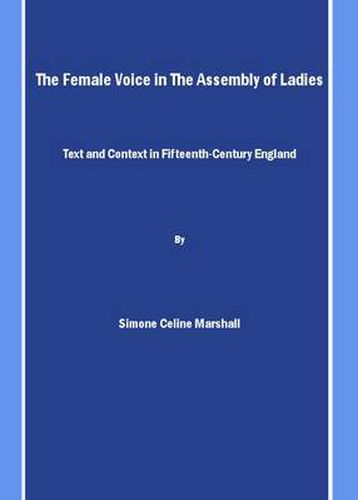Readings Newsletter
Become a Readings Member to make your shopping experience even easier.
Sign in or sign up for free!
You’re not far away from qualifying for FREE standard shipping within Australia
You’ve qualified for FREE standard shipping within Australia
The cart is loading…






The Assembly of Ladies is a fifteenth-century secular love poem in Middle English that adheres closely to conventional poetic structures, but throws these conventions into relief as it presents the narrative from a woman’s point of view, a rare occurrence for poetry of this period. Who wrote it, for whom and why, are questions about which we can speculate, but never ultimately answer-the poem itself gives us few clues. Yet the poem has had a remarkable shelf-life; in subsequent centuries the poem has continued to be noticed, read, and debated, as a small but significant artefact from fifteenth-century England. This book examines how fifteenth-century English social conventions impact upon gender relations in The Assembly of Ladies. By drawing on contemporary (and clearly influential) texts from the fifteenth century as a comparison, Marshall shows how The Assembly of Ladies has integrated social conventions into its themes and structure, elevating for the reader the ways that social and literary conventions impact on women in the production and consumption of literature.
$9.00 standard shipping within Australia
FREE standard shipping within Australia for orders over $100.00
Express & International shipping calculated at checkout
The Assembly of Ladies is a fifteenth-century secular love poem in Middle English that adheres closely to conventional poetic structures, but throws these conventions into relief as it presents the narrative from a woman’s point of view, a rare occurrence for poetry of this period. Who wrote it, for whom and why, are questions about which we can speculate, but never ultimately answer-the poem itself gives us few clues. Yet the poem has had a remarkable shelf-life; in subsequent centuries the poem has continued to be noticed, read, and debated, as a small but significant artefact from fifteenth-century England. This book examines how fifteenth-century English social conventions impact upon gender relations in The Assembly of Ladies. By drawing on contemporary (and clearly influential) texts from the fifteenth century as a comparison, Marshall shows how The Assembly of Ladies has integrated social conventions into its themes and structure, elevating for the reader the ways that social and literary conventions impact on women in the production and consumption of literature.